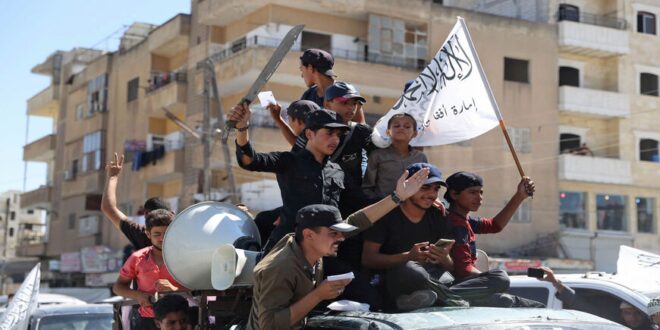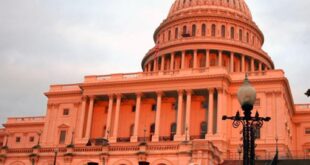Jihadis in Idlib believe that former al-Qaeda affiliate Hayat Tahrir al-Sham played a role in the killing of Islamic State leader Abu Ibrahim al-Hashimi al-Qurayshi during a US Special Forces operation in Idlib.
The Feb. 3 US Special Forces operation that led to the death of Islamic State (IS) leader Abu Ibrahim al-Hashimi al-Qurayshi has angered many jihadis opposing Hayat Tahrir al-Sham (HTS) in Syria’s northwestern province of Idlib.
The jihadis raised questions on the role HTS played in Qurayshi’s killing and the possible coordination between the United States and HTS, which controls Idlib. Another group of jihadis accused HTS of treason because it did not interfere to prevent this operation that lasted for more than two hours at the heart of its area of influence, where its security and military staff are heavily deployed. Others have even accused HTS of providing a safe haven for IS leaders and members in Idlib.
The controversy escalated among jihadis in light of HTS’ comments on the raid, since it took place at the heart of its area of control and security stronghold, and under the radar of its fighters who were closely watching what happened.
In response to the accusations, HTS said in a Feb. 6 statement that it did not know that Qurayshi lived in the safe house in the town of Atmeh before his death, and stressed its rejection of the US raid.
“We were not aware of the raid ahead of time,” it read, stating that HTS did not know who resided in the house. At the same time, HTS stressed that it will continue to ward off IS’ crimes.
The statement read, “The raid raised new concerns among Syrians, and it resulted in casualties among civilians, including women and children, which raised fear and panic among the displaced [living in the camps near the site of the raid] who fled the regime and Russian shelling to find refuge in the border areas.”
It continued that security in the area is the responsibility of the local authorities, which are defending the area from the Syrian government and all components that are trying to tamper with its security.
The US raid in the border town of Atmeh, north of Idlib, was followed by two hours of clashes between the attacking forces and those who were at the house. The operation resulted in the killing of the IS leader, in addition to at least 13 people, including six children and four women.
A source close to the jihadis in Idlib, who declined to be named, told Al-Monitor, “The way HTS dealt with the killing of [Qurayshi] raised many questions among the jihadis opposing HTS, especially those who are affiliated with al-Qaeda-affiliated Hurras al-Din.”
He said, “HTS imposed a security cordon around the site [during the raid], and its members were deployed in its vicinity, watching the course of the operation without interfering. This is what pushed the jihadis to accuse HTS of treason, of having knowledge of the operation and of providing a favorable security environment that facilitated its implementation.”
The source added, “HTS denying knowledge of the raid and its timing did not convince the jihadis in Idlib. What if the regime forces or the Russian forces were to carry out this raid and HTS leaders who are stationed in military and security headquarters close to that place were the target? Would HTS have stood idly by as it did in Atmeh? Of course not. The jihadis consider HTS’ claims as false. It is a mere attempt to cover up their involvement in the killing of Qurayshi.”
Talha al-Masir, aka Abu Shuaib al-Masri, an Egyptian jihadist who opposes HTS and who resides in Idlib, said on Telegram, “The crusader’s [US forces] landing in Atmeh amid a heavy HTS military presence in the area — through its security criminals on border posts along the [border with] the Olive Branch area, the crossings and checkpoints, as well as the peaceful way it dealt with the crusaders — clearly confirm that [HTS leader Abu Mohammed] al-Golani’s real project has nothing to do with defending Muslims, and the area and that the repeated defeats and loss of land are its expected outcomes.”
Issam al-Khatib, a former judge who defected from HTS, wrote on Twitter, “I told you that Golani’s security forces are on alert and have work to do. Indeed they remained on alert until the US landing began and ended. Then Golani’s followers stormed the place, looking for gold or money, like the gold they found where the former groups’ leader Abu Bakr al-Baghdadi was killed in Barisha two years ago.”
Saudi jihadist Majid al-Rashed said on Telegram, “Had you known Golani’s way of thinking, which is based on deception and insult and [on the idea] that the end justifies the means, you would think that he collaborates with the [US] intelligence.”
He added in another post, “I have no doubt that Abu Mohammed al-Golani and some of his commanders coordinate with US intelligence, and that denying knowledge of the landing is an outright lie. The operation lasted three hours. What did they do after they knew? They protected them.”
Abdul Rahman Abu Hamza al-Kurdi, a jihadist who defected from HTS, said on Telegram, “The protector of the Russians [in reference to HTS] deserves the title of IS protector, after [HTS] protected IS under its wing and harbored [IS] in its area, as it did in Idlib a few years ago in exchange for money.”
What further fueled the jihadis’ suspicions about HTS’ cooperation with the US forces is [HTS] crackdown on opposing jihadist groups in Idlib, coinciding with the death of Qurayshi. On Feb. 2, HTS arrested 20 jihadis, including Abu al-Bara al-Tunisi, a prominent Hurras al-Din leader. The jihadis believe that HTS plans to carry on with its crackdown and will focus more on foreign jihadis coming from the Maghreb countries.
 Eurasia Press & News
Eurasia Press & News




